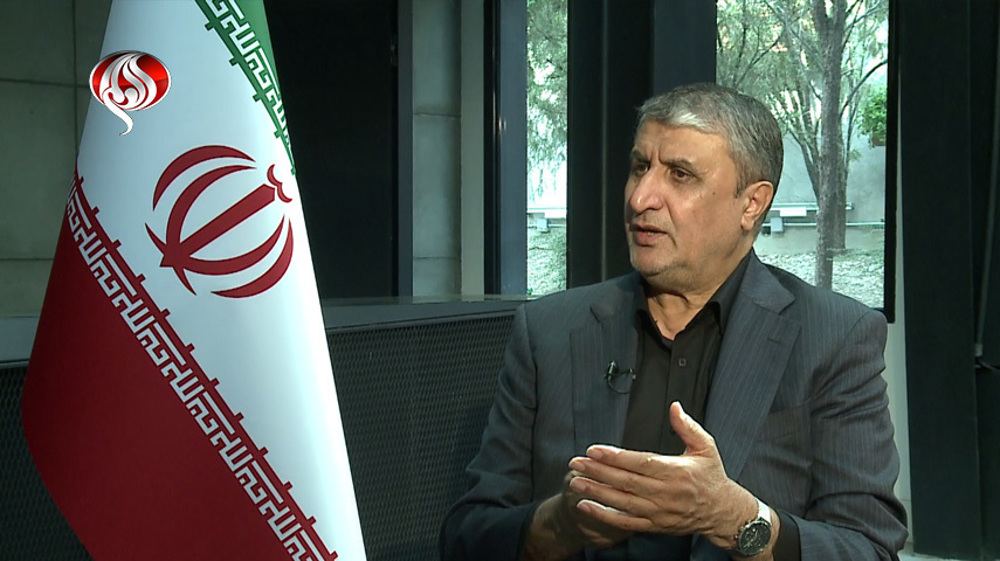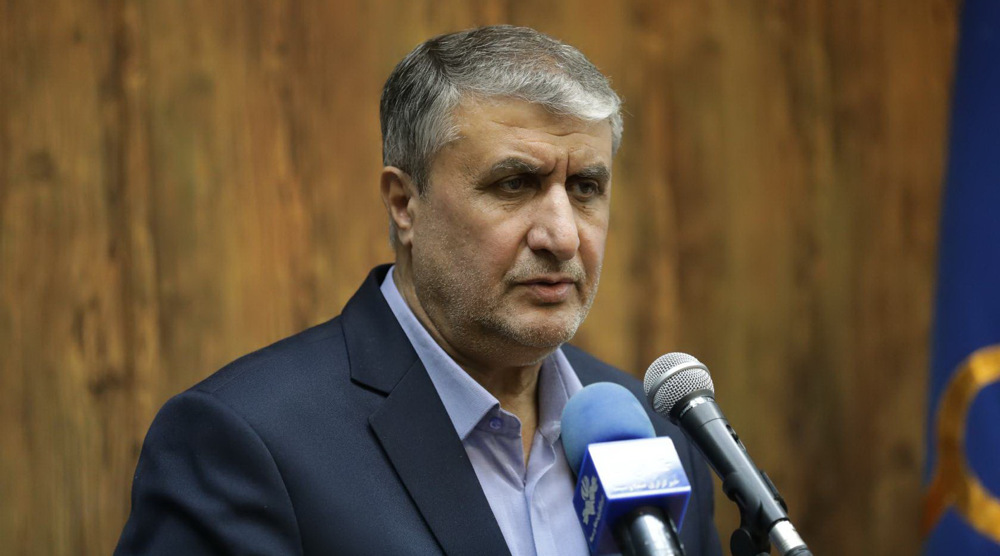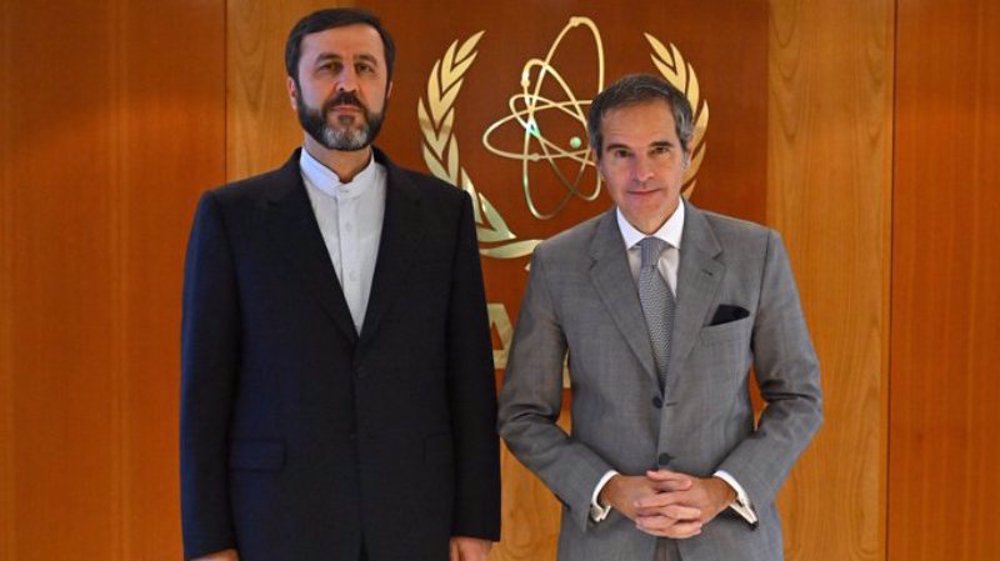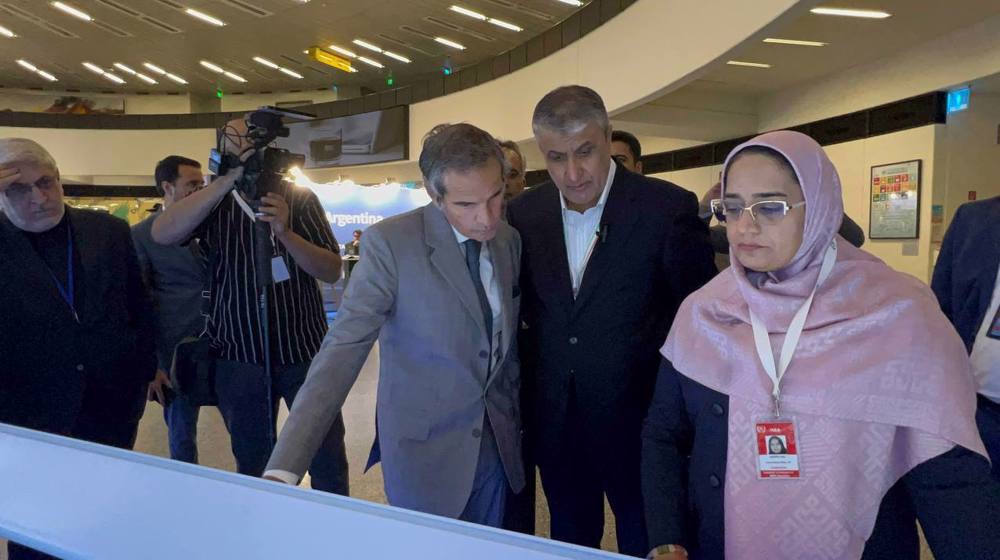Nuclear weapons not in Iran’s defense doctrine, belief: AEOI chief
The head of the Atomic Energy Organization of Iran (AEOI) has underscored the country’s commitment to the Nuclear Non-proliferation Treaty (NPT), saying there is no place for a nuclear weapons program in the Iranian defense doctrine or belief.
Mohammad Eslami made the remarks in an interview with Iran's Arabic-language Al Alam television news network on Thursday. He elaborated on such issues as the development of nuclear technology, the 2015 Iran nuclear deal and the Vienna talks on the removal of anti-Tehran sanctions.
“In the defense and security doctrine of the Islamic Republic of Iran, there is no need [for nuclear weapons] because it is against the beliefs and convictions of the Islamic Republic, and there is also a religious fatwa in this regard,” Eslami said.
The senior Iranian official said allegations leveled by the West against the Islamic Republic are only meant to sway the public opinion. He said they are deceiving themselves as the world is already aware that the West is by and large against Iran's acquisition of advanced technology and sovereignty.
Iran has invariably been committed to its obligations under the 2015 nuclear deal, officially known as the Joint Comprehensive Plan of Action (JCPOA), Eslami said. The West can return to the negotiations on the revival of the landmark accord if it has good faith, he added.
“If they have good faith and return to negotiations today, the Islamic Republic has been adhering and will continue to adhere to its commitments provided that they are honest and do not want to create an opportunity to harm the interests of the Iranian nation again.”
“Because this time around will not be like the past and they will meet countermeasures from the Islamic Republic over the slightest shortcoming and any slip in the implementation of their obligations.”
Eslami said the West is grappling with the "virus of sanctioning" while Iran’s actions are aimed at lifting the sanctions.
“Our actions and the expansion of our [nuclear] capacities will continue until the other party returns to its obligations and removes the sanctions and abandons claims which are basically accusations against the Islamic Republic.”
Throughout the years, Iran has said its nuclear program is for purely peaceful purposes and that it has no intention of developing nuclear weapons.
Leader of the Islamic Revolution Ayatollah Seyyed Ali Khamenei has even issued a fatwa (religious decree) declaring that the acquisition, development, and use of nuclear weapons violate Islamic principles and are therefore forbidden.
During the interview with Al Alam, Eslami also censured the “politically-motivated” behavior of the International Atomic Energy Agency (IAEA) and said talking with Israeli discourse is not typical of the UN nuclear agency.
“The Islamic Republic expects the Director-General of the Atomic Energy Agency to avoid political behavior and the use of literature that is not within the framework and not related to the rules and practices of the Agency,” he said.
“They know that there are no nuclear facilities Iran has not declared, and that Israel has provided them with these alleged documents,” Eslami said. “Speaking with the Israeli literature is not typical of an organization affiliated with the United Nations.”
Iran's lead negotiator Ali Bagheri Kani and his accompanying delegation left for the Austrian capital on Wednesday to resume the talks aimed at reviving the JCPOA and removal of anti-Tehran sanctions.
Iran’s state media announced on Thursday that Bagheri Kani had “met and conferred” with the European Union’s deputy foreign policy chief, Enrique Mora, as part of the long-running negotiations.
The former US administration led by President Donald Trump unilaterally withdrew from the JCPOA in May 2018, followed by the reinstatement of crippling sanctions on Iran under the so-called "maximum pressure campaign."
After exercising "strategic patience" for one year, Iran gradually started to scale back its commitments under the deal in 2019, holding both the US and Europeans responsible for it.
The talks to revive the landmark deal started in April last year with the participation of the remaining parties to the deal — France, Germany and Britain. While the parties noted progress in multiple rounds of talks, the indecisiveness shown by Washington prevented any significant breakthrough.
Last month, the talks moved to the Qatari capital of Doha in a different format, with Tehran and Washington holding indirect talks mediated by the European Union. The one round again failed to produce any desired result due to excessive demands of the US.
Iranian diaspora in EU, UK deplore ban on national airline
VIDEO | Press TV's News Headlines
Israel’s military struggling with shortage of troops: Report
Iran calls for more efforts to establish peace in Gaza, Lebanon
Israel targets journalists in southern Lebanon to mask atrocities
Trump vs Harris: A choice between two deranged war hawks who cheer genocide in Gaza
Over 1,800 Palestinians killed in Israel’s month-long attacks in northern Gaza
UN official urges Egypt to seize Israel-bound arms ship MV Kathrin










 This makes it easy to access the Press TV website
This makes it easy to access the Press TV website